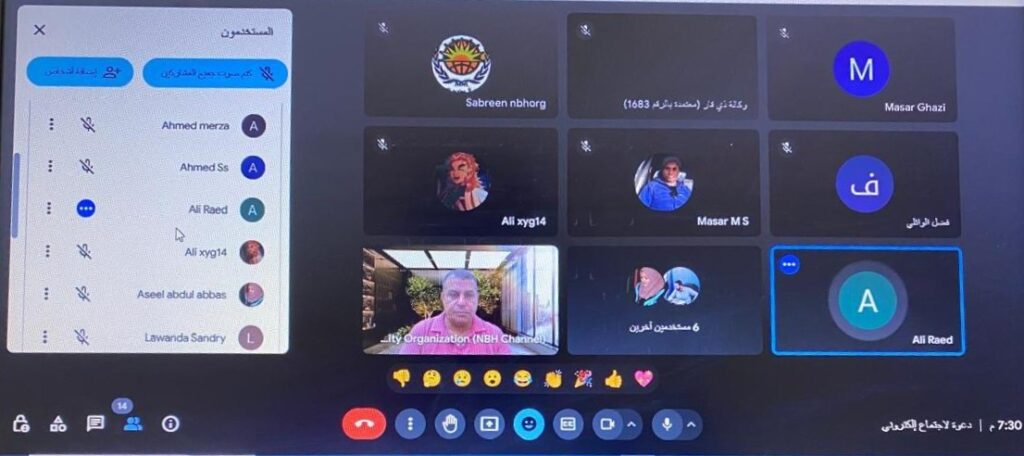Activity Report the second electronic dialogue session “Empowering Communities through Advocacy for Coordinating and Localizing Humanitarian Work”.
Date of Activity: June 5, 2024
Location: Online (Google Meet platform)
Organizing Body: No Borders Humanity Organization (NBH)
Partners: International Council of Voluntary Agencies (ICVA)
Participants
- Experts in humanitarian work
- Academic professors
- Leaders of non-governmental organizations (NGOs)
- Civil activists
Session Objectives
- Enhance concepts of community empowerment.
- Discuss strengths and weaknesses in the field of community empowerment and localization of humanitarian work.
- Highlight the role of civil society in achieving these goals.
Agenda
- Opening and Welcome:
- Welcoming remarks from the Chairman of No Borders Humanity Organization (NBH).
- Introduction to the project “Empowering Communities through Advocacy for Coordinating and Localizing Humanitarian Work”.
- Presentations:
- Presentation by experts in community empowerment: Mr. Ammar Al-Ghurabi, Ms. Sabreen Al-Waeli, and Dr. Masar Al-Ghurabi.
- Presentation by experts on the importance of localizing humanitarian work: Mr. Raed Al-Ausi, Mr. Ali Abdul Karim, and Dr. Asil from the College of Media, Thi Qar University.
- Dialogue Session:
- Interactive discussion among participants on the strengths and weaknesses in the field of empowerment and localization of humanitarian work.
- Sharing experiences and insights from NGOs and civil activists.
- Recommendations:
- Formulating practical recommendations to enhance the role of civil society in empowering communities and localizing humanitarian work.
Summary of Discussions
- Strengths:
- The accumulated experience of NGOs in dealing with community issues.
- International support and funding directed towards empowerment and localization projects.
- Weaknesses:
- Lack of local resources and financial sustainability for projects.
- Logistical challenges in implementing projects at the local level.
- Role of Civil Society:
- Strengthening partnerships with governmental and international entities.
- Raising awareness and training local communities on how to utilize available resources.
Recommendations
- Strengthening Partnerships:
- The necessity of strengthening partnerships between NGOs and governmental entities to ensure the sustainability of projects.
- Awareness and Training:
- Implementing awareness and training programs for local communities to increase understanding of the importance of empowerment and localization of humanitarian work.
- Resource Provision:
- Working on securing sustainable financial and logistical resources to support empowerment projects.
Conclusion
The session concluded with thanks to the participants for their attendance and valuable contributions, emphasizing the importance of continuing dialogue and cooperation to achieve the goals of community empowerment and localization of humanitarian work.






Report Prepared by: NBH Media Team